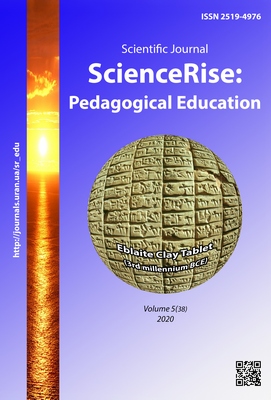Basic principles of praxeological competence formation in future masters of dentistry
DOI:
https://doi.org/10.15587/2519-4984.2020.212893Keywords:
medical education, practical training of dentistry masters, principles of praxeological competence formationAbstract
The problem of definition of key principles of forming the praxeological competence of a future specialist in the system of higher medical, especially dentistry, education, is considered, based on the analysis of the international experience, especially one of countries-participants of the Bolognese process that the Ukrainian system of higher education continues to integrate in, and contributions of native scientists-teachers. It is underlined, that modernization of the educational process at globalization and migration of the planet population needs constant renewal and optimization of its theoretical grounds, based on the competence approach for providing specialists’ employment. An important place in this process belongs to the definition of basic functioning principles of all development elements of the education system, especially practical training. Attention is paid on the importance of observance of both legally accepted development principles of the education system, students’ civic rights and ones, providing its innovativeness and social demands.
The retrospective analysis of the development of “praxeology” science and views of modern scientists on introduction of the praxeological approach and its importance for increasing the quality of practical training of graduates of higher medical educational institutions has been conducted.
It is determined, that one of main components of the effective practical training of future dentistry masters at higher medical educational institutions is praxeological competence formation that provides further high-quality professional activity in the sphere of not only manual skills, but also determination of optimal organizational forms, methods, selection of materials in the professional activity of a physician-dentist.
Based on the analysis of scientific sources and own studies, there have been concretized main principles of praxeological competence formation in dentistry masters, namely: successiveness, transparency, demonstrability, scientism, rationality, creativity, efficiencyReferences
- Curaj, A., Pricopie, R., Deca, L. (Eds.) (2018). European Higher Education Area: The Impact of Past and Future Policies. Springer, 721. Available at: http://doi.org/10.1007/978-3-319-77407-7
- Zakon Ukrainy «Pro osvitu» (2014). Uriadovyi kurier, 146, 7–18.
- Guiding Principles for Higher Education. Available at: https://www.cois.org/colleges-and-universities/guiding-principles-for-higher-education Last accessed: 20.08.20
- Kulbashna, Ya. A. (2014). Formuvannia profesiinoi kompetentnosti maibutnikh fakhivtsiv iz stomatolohohii: teoretychni y metodychni osnovy. Kyiv: Kompas, 416.
- MOZ Ukrainy opryliudnylo dlia hromadskoho obhovorennia Stratehiiu rozvytku medychnoi osvity. Available at: https://moz.gov.ua/article/reform-plan/moz-ukraini-opriljudnilo-dlja-gromadskogo-obgovorennja-strategiju-rozvitku-medichnoi-osviti Last accessed: 17.08.2020
- Abeshu, G., Urgessa, D., Sintayehu, A. (2020). Perceived features of practicum effectiveness and acquired professional competences among graduate class students in Dilla University. ScienceRise: Pedagogical Education, 4 (37), 4–8. doi: http://doi.org/10.15587/2519-4984.2020.206234
- Turning Education Structure in Europe (2000). Available at: https://www.unideusto.org/tuningeu/ Last accessed: 20.08.2020
- Lukashchuk, M. M., Lukashchuk, I. M. (2018). Prakseolohichna spriamovanist formuvannia profesiinoi identychnosti maibutnikh medychnykh sester v protsesi navchannia khimiko-biolohichnykh dystsyplin v medychnomu koledzhi. Molodyi vchenyi, 2 (2), 626–630.
- Kotarbinskii, T. (1975). Traktat o khoroshei rabote. Moscow: Ekonomika, 271.
- Polishchuk, V. A. (2014). Prakseolohichnyi pidkhid yak innovatsiina osnova vdoskonalennia profesiinoi pidhotovky maibutnikh sotsialnykh pratsivnykiv. Naukovyi visnyk Uzhhorodskoho natsionalnoho universytetu. Seriia: Pedahohika, 32, 148–150.
- Kulbashna, Y. A., Malanchuk, V. O., Nahirnyj, Y. P., Skrypnyk, I. L., Zakharova, V. O. (2020). A modern model of masters’ in dentistry professional training. Medical Education, 1, 45–49. doi: http://doi.org/10.11603/me.2414-5998.2020.1.10992
- Pro vyshchu osvitu (2014). Zakon Ukrainy No. 1556-VII. 01.07.2014. Available at: https://zakon.rada.gov.ua/laws/show/2145-19#Text Last accessed: 20.07.20
- Seven Principles for good Practice in Undergraduate Education. Available at: https://new.utc.edu/academic-affairs/walker-center-for-teaching-and-learning/online-resources/seven-principles-for-good-teaching
- The Civil Rights for Higher Education (2019). Available at: http://civilrightsdocs.info/pdf/reports/Higher-Ed-Civil-Rights-Principles.pdf Last accessed: 20.08.20
- Nietzel, M. T. (2020). Three Core Principles For Higher Education As It Prepares For Its Pandemic-Uncertain Fall. Available at: https://www.forbes.com/sites/michaeltnietzel/2020/04/09/three-core-principles-as-higher-education-prepares-for-its-pandemic-uncertain-fall/#77c2cf1c348f Last accessed: 20.08.2020
- Blanco, G., Hans de Wit (2020). The Response of International Higher Education Associations to COVID-19. International Higher Education, 102, 11–15.
Downloads
Published
How to Cite
Issue
Section
License
Copyright (c) 2020 Yaroslava Kulbashna, Iryna Skrypnyk

This work is licensed under a Creative Commons Attribution 4.0 International License.
Our journal abides by the Creative Commons CC BY copyright rights and permissions for open access journals.
Authors, who are published in this journal, agree to the following conditions:
1. The authors reserve the right to authorship of the work and pass the first publication right of this work to the journal under the terms of a Creative Commons CC BY, which allows others to freely distribute the published research with the obligatory reference to the authors of the original work and the first publication of the work in this journal.
2. The authors have the right to conclude separate supplement agreements that relate to non-exclusive work distribution in the form in which it has been published by the journal (for example, to upload the work to the online storage of the journal or publish it as part of a monograph), provided that the reference to the first publication of the work in this journal is included.







